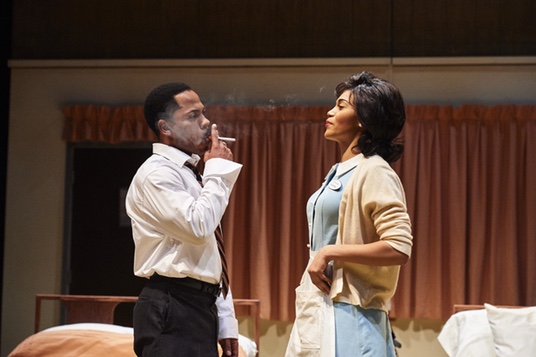Through Sun 2/14
So I went to The Mountaintop January 29 at the Cleveland Play House’s Outcalt Theatre in Playhouse Square. Directed by Carl Cofield, it’s an imagined encounter between Dr. Martin Luther King, Jr. and a hotel maid on April 3, 1968, King’s last night on earth. The story’s strange combination of reality and fantasy did invoke memories of the civil rights struggles, the sacrifice and the fear and the bravery shown then.
On the other hand, the CPH production raises the question about whether or not playwright Katori Hall created a persuasive story or a fantasy or a confused mashup of the two. That makes it highly entertaining. No one went to sleep.
The title comes from King’s closing metaphor that Memphis night where he takes the identity of a modern-day Moses who has spoken with God on a mountaintop. The play itself imagines what might have happened afterwards at the Lorraine Motel in Memphis, Tennessee. King (strongly presented by Ro Boddie) has just returned from speaking to a huge crowd in support of a local workers’ strike. He has been facing increasing death threats. (He was a magnificent speaker with near operatic vocal ability as this segment taken on that April night makes abundantly clear. Try to watch it without tears — pretty hard to do.)
Perhaps ironically, his speech ended with premonitions of his own death: “Like anybody, I would like to live a long life. Longevity has its place. But I’m not concerned about that now. I just want to do God’s will. And He’s allowed me to go up to the mountain. And I’ve looked over. And I’ve seen the Promised Land. I may not get there with you. But I want you to know tonight, that we, as a people, will get to the promised land!”
But when the play opens it’s late, he’s tired, and all he wants is a simple cup of coffee. When a maid brings it to his room (with a now-vintage coffee pot and fancy cups on a tray), he gets a whole more than that. (Ignore the fact that it’s unlikely a cheap 1960s motel would even have room service.)
Camae, the maid (a sassy Angel Moore), shares a cigarette with him as she gradually engages him in a discussion that challenges King’s perception (and ours) of reality. To say more wouldn’t be fair to those who enjoy theatrical surprises. Of course we know Camae will be different or she wouldn’t be on the stage — but whether or not audiences can accept her difference might be key to whether or not they find the encounter convincing or the ending forced.
Tasked with playing one of the greatest orators of our time, Boddie presents a handsome, driven figure, but doesn’t consistently invoke MLK’s charisma. Moore (I had to check her first name twice, really?) moves from super-polite to potty-mouth to wise woman with grace, bringing as much credibility as possible to Camae.
The Lorraine Motel set designed by Wilson Chin looks just right (although the room’s bigger than most 1960s motel rooms would have been) with plain furnishings and a big picture window.
So did Hall make us feel “those days?” In a way, yes, when she stuck to dramatic recreation of what we can gather from historic accounts of April 3 and April 4. But also, no, because events turned too fantastic and seemed to split the play in half: close looks at famous people when they relax in one half and a “Venus in Furs”/Disney adventure in the other.
Bottom Line: Despite the fact that I didn’t buy part of the storyline, I was never bored or tempted to sleep. What more, really, can you ask of a play? And it did make me think and that’s never to be glossed over.
The play’s run time is 90 minutes (no intermission) which is a challenge in some Outcalt theater seats — great views in every seat, but if your legs are long, mention it when you buy tickets, some places are better than others. For tickets call 216-400-7027 or go to clevelandplayhouse.com.
[Written by Laura Kennelly]
